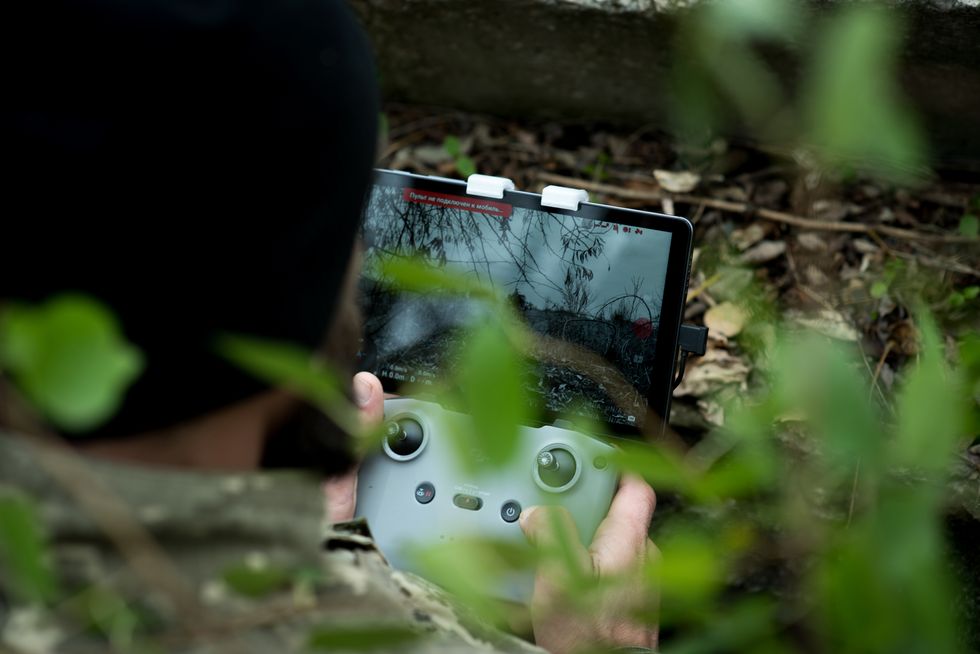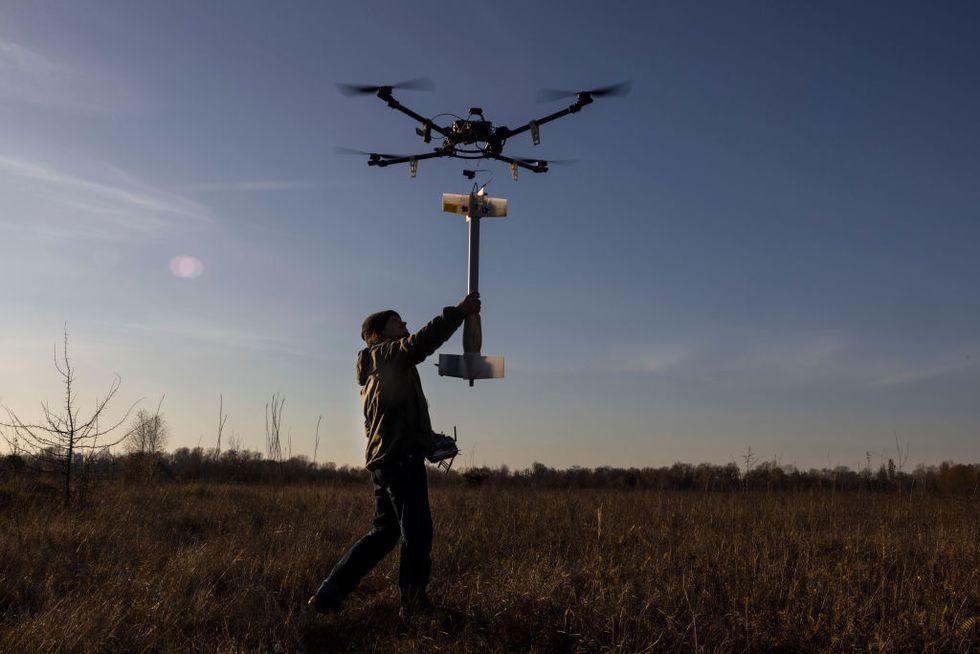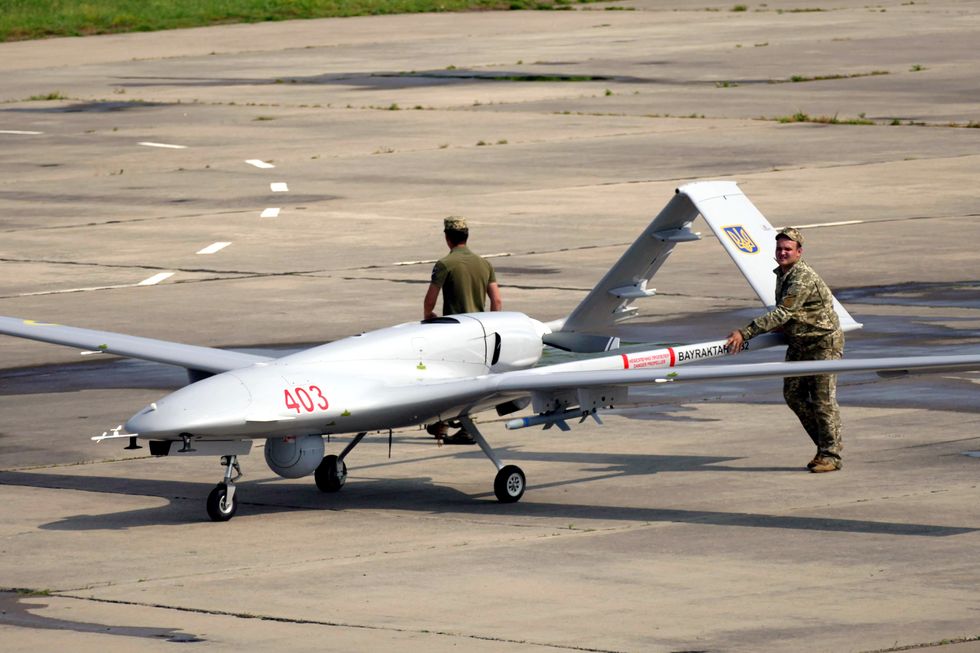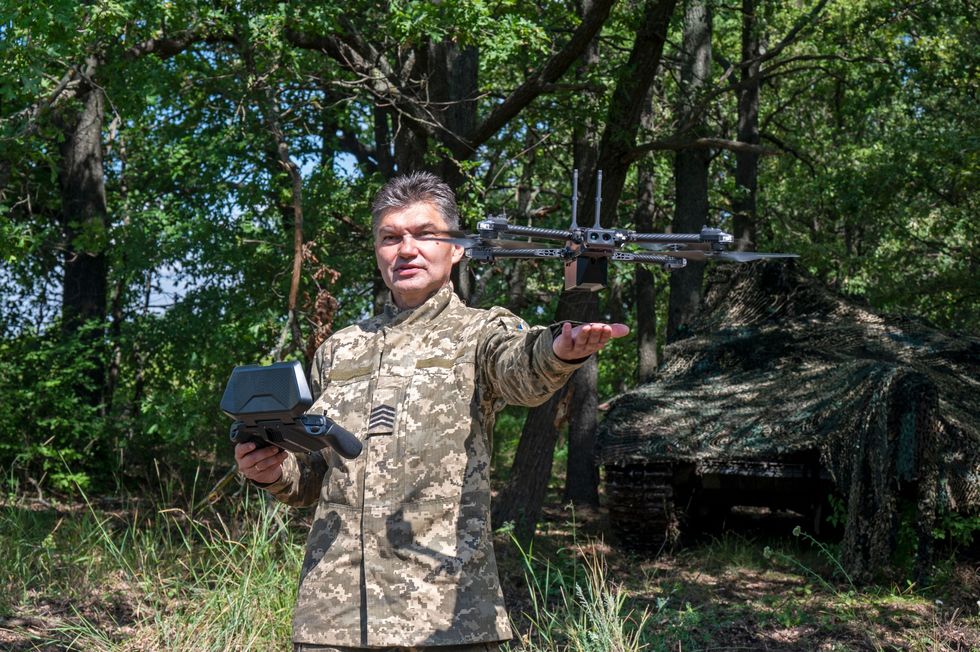DONBAS AND KYIV, UKRAINE—A Ukrainian soldier dressed in camouflage fatigues sat on the couch with a controller in his hand. He would have looked like he was playing a video game if the house he was in had doors or windows. Instead, it was a blown-out wreck, its floor covered in rubble and broken glass. It’s a familiar sight among the houses in the town of Soledar in the Donbas region of Ukraine, which has been under relentless Russian assault for over six months.

Above the house, a small drone—probably a DJI Mavic II—zipped over the roof toward the battlefield beyond. Around us, we could hear the constant boom and crack of gunfire and artillery. These small, inexpensive, and easily disposable drones have become indispensable for Ukrainian troops attempting to spot Russian positions on the frontlines.
“We can buy them for just $1,000 off Amazon,” Stanislav Krasnov, a 35-year-old Ukrainian soldier, told Popular Mechanics during a visit to the Donbas front lines earlier this year. Each morning, when the nightly artillery barrage had slowed down, he and his wife Oksana, 26, would get out their drone and zoom it across the sky.
As we looked through the viewfinder on the controller, you could see endless rolling plains, each pock-marked with holes from thousands of artillery impact strikes. It came as no surprise to the Krasnovs that Russian forces would regularly shoot down their hobbyist drones. But at such a low cost, they’re simple to replace; the couple regularly sets up fundraisers for them on Facebook, where they also post regular photos of their military units in action.
At the beginning of the war, Western military analysts—and even the Ukrainian military—expected the Russian air force to quickly achieve air dominance in the skies as it had in Georgia in 2008 and Syria in 2015. The Ukrainian air force was, in the words of one report, “totally technically outmatched and badly outnumbered.”
In fact, the first major Russian operation was meant to land a large group of elite VDV paratroopers at the Hostomel airfield on the outskirts of Kyiv, and secure it as a staging point to airlift regular troops for a lightning strike on the capital. But due to some elaborate deceptions and maneuvering—assisted by detailed U.S. intelligence of incoming strikes— the Ukrainians managed to protect their air defenses, and shoot down many Russian aircraft, keeping their own air force alive.
“Russian jets rarely enter Ukrainian airspace anymore,” according to Justin Bronk, an airpower expert from the Royal United Services Institute. In an interview with Popular Mechanics, he explained that the man-portable air-defense system (MANPADS), portable rocket launchers that individual soldiers could carry, made the cost of flying traditional sorties over Ukraine impossibly costly.
So now, Russian jets are far more likely to sit over the border in Russian air space: out of reach of Ukrainian anti-aircraft batteries, but able to lob missiles against fixed targets such as military barracks or civilian infrastructure like power stations.
But over the skies of Ukraine, itself, unmanned aerial vehicles (UAVs) are mostly conducting the battle. This conflict has proven them to have several significant advantages over fixed-wing aircraft. First, they do not put a highly trained pilot in the air. That means there are no human casualties if the aircraft is shot down, and that it doesn’t require advanced skills to learn how to pilot them. A top gun requires around three years of training, but many drones are simple enough that an untrained private can learn to fly them in just an afternoon.
The Azerbaijani army first cracked this concept in its war with Armenia over the disputed territory of Nagorno-Karabakh in 2020. It used relatively cheap Turkish drones like the Bayraktar TB-2—which the Ukrainians have also used—to exploit gaps in Armenian air defenses, overwhelming the Armenian army in 6 weeks, and leading some soldiers on the ground to dub it the “first video game war.”
Comparatively, both states in the Russo-Ukrainian war have a wealth of resources, but the primary drones being used have smaller price tags than in the conflict between Azerbaijan and Armenia. However, they do appear in larger numbers. One particular model has been causing Ukraine more grief than anticipated.
Around 8 a.m. on Monday, October 17, 2022. the residents of Kyiv were awakened by the sounds of multiple explosions and automatic gunfire throughout the city center. It was a throwback to the terrible first weeks of the war, when battles raged on the city’s outskirts. Kyiv felt like a war zone for the first time since April. The culprits were quickly discovered to be HESA Shahed 136 loitering munitions, originally made in Iran, and modified by Russia for use in the Ukrainian battlespace. These suicide drones would dive at their targets and explode on impact.
It also signaled a major change in Russian strategy in Ukraine, where it would expend cheap munitions on civilian infrastructure targets. Completely unprepared for this onslaught, Ukrainian police were resorting to using their service-issue assault rifles to try to shoot the attackers out of the sky. The first wave of major strikes took nearly one-third of Ukraine’s electricity-generating plants offline . . . at least temporarily.
While they only carry around half the explosive power of traditional jet-launched bombs, loitering munitions are inexpensive, and their small size makes them difficult to track through Ukraine’s airspace until they are very near their targets. While effective defenses do exist in the forms of air-to-air missiles and MiG-29 fighter jets, the cost of these is much higher than that of the drone attacks, themselves. The drones can be produced for about $20,000 per unit.
One analysis suggested that Ukraine had spent $28 million in just over a month compared to a Russian spend of between $11–18 million. Given that Russia’s GDP is almost ten times that of Ukraine, the differential means this strategy is vastly in Russia’s favor.
Experts point the finger for this campaign at the newly appointed theater commander in Ukraine, General Sergei Surovikin. “Let’s be clear, it is not Surovikin who is the driver of this strategy, but the other way around—Surovikin was appointed to carry out this strategy,” Bronk says. “He was the commander of Russian forces in Syria, and led a very brutal air campaign in Aleppo against civilian infrastructure. Make no mistake, thousands of Ukrainian civilians are likely to freeze to death this winter because of damage to electricity infrastructure.”
In November, Ukraine notched up one of its biggest battlefield victories when its armed forces retook the city of Kherson, the one provincial capital Moscow had seized during its invasion. In retaliation, the Russians launched their largest waves of attacks on Ukraine’s power infrastructure to date. Residents hid in air raid shelters throughout the country, while cities fell into a blackout.
Meanwhile, the first snow fell on the streets of Kyiv, heralding the start of the most punishing winter in Ukraine’s recent history.




